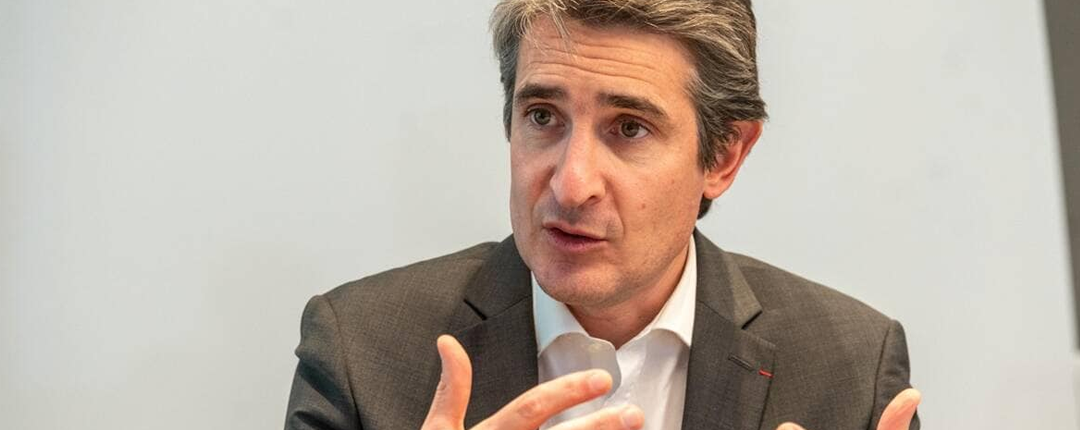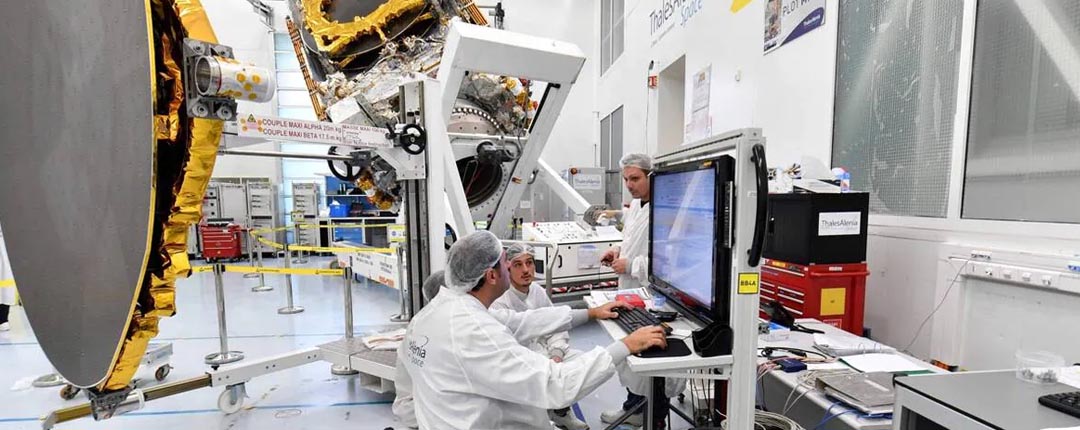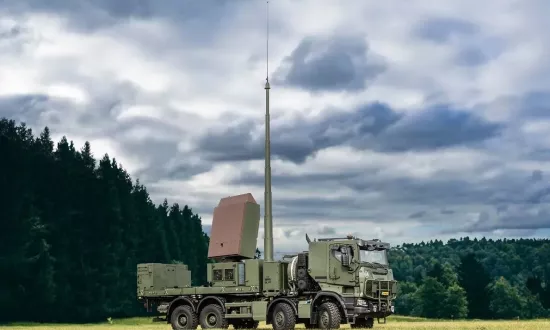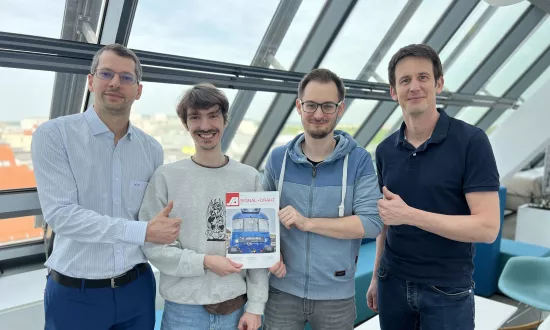Interview of Patrice Caine in Ouest France
Article published by Ouest France on 22 December 2022. Translated with the kind permission of Ouest France. Read the article in French on Ouest France website: ENTRETIEN. En France, « nous disposons d’ingénieurs de très haut niveau », observe le PDG de Thales.
France has "high-level engineers"
Patrice Caine, Chairman & Chief Executive officer of the technology group Thales, talks about 21st century warfare, the benefits of satellite technology, even in our everyday lives, and the company's strong roots in Western France.

They say you are the eyes and ears of the submarine fleet…
I just watched « Le chant du Loup » again (a movie about a French nuclear submarine sent to recover special forces troops on the ground, but things don't go as planned. The film's title refers to the name given by French naval personnel to the sound of an enemy sonar searching for your submarine – ed.) and I enjoyed it just as much as the first time. The sonars designed by Thales are mind-blowing. We're very proud to be working for Naval Group and the French Navy, and with Dassault for naval aircraft. And we have again been recognised by the US Navy, which is a customer of ours for certain cutting-edge technologies that they can't find in the United States: for example, we are equipping the US Navy and the Coast Guards. It's a sign of our global excellence. Our Brest site (1,800 employees) has played a prominent role in developing this highly specialised expertise. Dipping sonars are a very fine success story.
Dipping sonars?
These sonars are deployed by helicopters to hunt for submarines. How do they find them? If you've seen The Wolf's Call you will probably remember the machines that are lowered by cable and dipped a few metres into the sea. That's why they're called dipping sonars. They emit sound waves that are reflected by any submarine that happens to be in the vicinity. This underwater acoustics expertise is also needed for other applications like mine countermeasures.
Aren't mines outdated in an age of electronic warfare?
You're thinking about those round things with spikes that were used in the Second World War? We obviously read the same comic books! Yes, these mines are unfortunately still around. To neutralise them, we will be using surface drones, which are like little autonomous boats with no crew. The surface drones carry little robots equipped with sonars that map the bottom of the sea and detect everything between the seabed and the surface. Then another type of robot is sent in to destroy the mines with an explosive charge. So yes, mines are indeed part of 21st century warfare.
Where are they used today?
They are used in places like the Persian Gulf and the Red Sea. They're a big danger because they're extremely difficult to detect. They can even be concealed inside washing machines and dumped at the bottom of the sea, or made to look like rocks. It's the types of metals used that makes it possible to detect them in those cases.
It's possible to kill people remotely, using drones for example. Don't these new forms of warfare pose ethical problems for you?
You're quite right that military drones raise important ethical questions. But decisions about using them are made by the government and the head of State elected by universal suffrage. It's up to them to decide what is authorised or not, and what is sold or not sold to a given country. As defence minister Florence Parly has said, you can't put the tobacco industry, for example, in the same category as defence, which is about keeping us all safe. There won't be a future at all if we destroy the planet and the environment. But neither will there be a future if our governments are unable to guarantee the security and stability of our democracies. We mustn't be naive.
What are you most concerned about?
After the fall of the Berlin Wall, some people foresaw a very long period of peace. And yet we are entering an age of greater and greater conflict, even in space. We are facing a level of geopolitical tension that we haven't seen for a long time. There are latent conflicts, sometimes even armed conflicts, in our own back yard. Look what's happening in Ukraine. CSR (Corporate Social Responsibility) or ESG ([extra-]financial criteria) is a topic of major importance and a compass to guide the actions we take to build a safer, greener and more inclusive world. In strictly financial terms, the challenge in Europe is to make [investment] management companies aware of the role that defence plays in our democracies so they can put the right value on our industrial activities. Investment funds in the United States have fully assimilated the fact that you can't have sustainable development without stability.
You talk a lot about threats to our democracies. But a European defence capability is struggling to take shape…
Europe isn't all one piece like the United States. It isn't a country but a cathedral that has been built, piece by piece, over time. Some things are moving ahead, others not so much. Let's look at the bright side: for the first time, Europe has just set up a European Defence Fund, which will finance research programmes. Several cooperation programmes have been successes: the Tiger (Franco-German attack helicopter) and the NH90 (European transport helicopter) are fantastic technological successes.
And although the A400M programme was hard to complete, we now have the only aircraft of its kind in the world (the programme experienced various technical and financial difficulties; the aircraft can be used to refuel helicopters in flight – ed.). It was a tour de force by Airbus. There is growing awareness of the importance of defence, even in the countries that have not been sensitive to these issues in the past. We need to be realistic and optimistic. We can also be reasonably hopeful because as an industry, we are working on major programmes with long cycles.
Do you agree with the analysis that France is losing its place in the big league?
No, absolutely not. We are among the world leaders in several sectors, and Brittany is a contributor. In Étrelles (Ille-et-Vilaine), for example, we produce very high-tech electronic circuit boards that are used in the radars for Dassault's Rafale aircraft. The Brest (Finistère) site is a global benchmark for underwater acoustics. And the Cholet (Maine-et-Loire) site, which will soon celebrate its 100th anniversary, specialises in secure military communications. International markets account for 80% of our revenues. Yet half of our workforce, three-quarters of our fundamental research and two-thirds of our R&D are based in France, in part because of the key role of the French defence procurement agency (DGA). These strong roots in France are a good indicator of the expertise we have here. One of the strengths of our country and its regions is having access to the very high-level engineers that a group like ours needs to drive its growth and development. That can sometimes be a problem in other countries, like the United States, which until now has used targeted immigration from Asia, including China, to fill the gap.
Satellites will help to bridge the digital divide

Has Europe lost the battle for space?
Not at all! Some people have focused on launch vehicles, which is one area where the Americans have indeed moved very fast with SpaceX. But SpaceX is just one part of the space sector, not the whole story! Launch vehicles are needed, of course, and Europe has Ariane, so yes, Ariane also needed to develop reusable launch vehicles. In any case, things happen in steps and stages in every industry. Ariane has negotiated the turn, and when I look at Thales Alenia Space and the European satellite industry, we are definitely at world-class level.
Thales Alenia Space – our space business – built almost all the satellite constellations in service today. We even won the latest constellation in a competitive tender: three years from now, it will be operated by the Canadian company Telesat, whose funding is now being finalised, and will have been entirely built by Thales Alenia Space – in France, I may add. We have nothing to envy from Elon Musk: this constellation will be just as powerful as Starlink but with 300 satellites instead of 6,000. So in terms of space pollution, we are in a much better position.
What's the point of it all?
Space is the stuff of dreams. You can observe all sorts of things from space that you couldn't see from Earth. With climate change, for example, satellites built by Thales Alenia Space for the European Space Agency (ESA) provide precise measurements of greenhouse gases, sea levels and temperatures, the chemical composition of the oceans, and the level of pollution and ice-melt. Space exploration is also one of the few areas where international collaboration is still alive and well – it requires so many financial, human, intellectual resources. The Perseverance rover (the vehicle developed by NASA to explore Mars – ed.) is a fantastic machine. We designed the new-generation laser that equips Supercam. It is used to heat Martian rock to 1,000 degrees: by pulverising it and measuring the wavelengths of the light it gives off, it is possible to deduce the chemical composition of the Martian soil.
How does space affect our daily lives?
In the past, satellite communications were only used by a few privileged people or the armed forces as a way of staying in touch 24/7, or in atypical applications like the Vendée Globe yacht race. Tomorrow, satellite communications will be useful for providing remote areas with broadband Internet access. Satellites are the only way to bridge the digital divide for all and to make it possible to work remotely, follow distance-learning courses or consult a doctor from a chalet high in the mountains – where it wouldn't make economic sense to install optical fibre. In mid-2022, we are going to launch Konnect VHTS, the world's most powerful communications satellite, which will be operated by Eutelsat. In France, subscribers will be able to sign up with Orange for an Internet connection with the same quality of service as fibre.
With the takeover of Gemalto, you also have also conquered the market for smartcards…
Put simply, we're talking about payment cards or the SIM card in your telephone. But the technological feat is being able to make the highly secure (little) software program inside the card that establishes your identity. The public health crisis suddenly led to a huge increase in contactless payments – of up to €50 to limit the risks if your card is stolen. For higher amounts, we have developed a payment card with a fingerprint scanner, which has been available from BNP Paribas since last autumn and is the first card of its kind in the world. We are also developing software for the police that can reconstitute fingerprints found at crime scenes so they can be compared with the databases.
You have teamed with Google in the cloud (Internet data hosting). Isn't it a threat to our sovereignty?
We also work with other cloud providers like OVH in France. In fact, we offer various different solutions depending on the level of security required by each of our customers in terms of data protection and/or nationality. There's a secure cloud solution for every customer. Sovereignty is a very important word, referring to anything that puts the State or the nation in danger. For example, we have developed a "restricted level" cloud solution that offers an extremely demanding level of security and could be used by the defence ministry and its partners, and we have also developed a defence cloud solution that has been selected by NATO.
We wouldn't want the United States peeking at our family photos!
In that case, don't put them in a cloud that isn't secure! If you want storage that's easy to use and inexpensive, the cloud is a good solution. But your family photos have nothing to do with sovereignty.
On the other hand, you might want to use a solution offered by one of the big American cloud providers without letting them manage your encryption keys, in other words the security of your data. In that case, you can use a trusted third party like Thales. With Google, we have put several mechanisms in place to protect data from foreign interference: it's stored on servers and datacentres in France, and can only be accessed by people accredited by Thales.
How do you attract young talent to work for you instead of Google?
This year, Thales plans to hire 11,000 people, including 3,500 in France. A lot of them are attracted by the diversity of our sectors of activity and the wide variety of job types we offer – everything from ethical hacking to exploring Mars or the Moon! I think we can also offer extra meaning. After the terrorist attacks in Paris, we saw a sort of "call to vocation". When you devote your time to the security of your country, for example by serving the armed forces, you're bound to feel you are doing a little more than just showing up to work.
Patrice Moyon and Gaëlle Fleitour.


